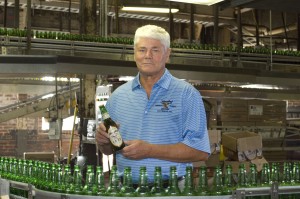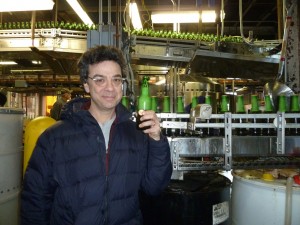Season 1, Episode 1
About one-third of the companies in the Fortune 500 are family-controlled firms. Isn’t that amazing? Isn’t that fantastic?
You know the story. Some incredibly hard-working person starts a business – maybe a bakery or a brewery, a carmaker or a newspaper – and, against all odds, the business doesn’t just succeed; it flourishes. But someday, it’s inevitable that the founder will retire (or die). So who takes over then?

Dick Yuengling, CEO of D.G. Yuengling & Son brewery, stands on the bottle shop floor with a bottle of his lager. He is the fifth male Yuengling to run the firm; two of his daughters are being prepped to (someday) take over. (Courtesy Yuengling Brewery)
That’s easy: the founder’s son or daughter. The scion of the family. Who better to protect and grow the family brand?
Makes sense, doesn’t it? Who could possibly work harder than someone whose name is on the building?
The family firm is a way of life. And it’s a nice story. But we’ve got a big, hungry economy here, people. “Nice” doesn’t necessarily generate jobs; “nice” doesn’t increase productivity or spur innovation. So when it comes to putting the family scion in charge of a company, here’s what we wanted to know: what do the numbers say?

Antoinette Schoar, an MIT economist who has studied family succession. (Courtesy Antoinette Schoar)
That’s the theme of our first hour-long episode of “real” radio, called “The Church of Scionology.” What I mean by “real” is that, even though we’ve been making Freakonomics Radio content for more than a year, until now it’s been in the form of podcasts (subscribe to iTunes here) and brief segments on Marketplace.
Now we’re hitting the airwaves in a big way on public-radio stations across the country. We have made five one-hour programs: “The Church of Scionology,” “The Economist’s Guide to Parenting,” “The Suicide Paradox,” “The Folly of Prediction,” and “The Upside of Quitting.”
WNYC in New York will broadcast the first episode on Fri., June 3 (3pm on 93.9 FM and 8pm on 820 AM), and will run the next four on subsequent Fridays at the same time, with a “shark week” (all five programs replayed in one week) during the week of June 27 (every day at 2pm on 93.9 FM and 8pm on 820 AM). We don’t have a complete schedule of when other stations around the country will be playing the hours, but you should be able to find out via your local station. You can also listen using the media player at the top, and use this map for the stations information that we do have. Let us know what you think!
If you are a devout Freakonomics Radio listener, you’ve already gotten a small taste of the “Scionology” episode in a Marketplace segment and podcast about Peter Buffett, son of Warren. But in this hour, there is much, much more.
The episode is built on a foundation of academic research by economists including Antoinette Schoar, Vikas Mehrotra, and Francisco Perez-Gonzalez. Among the papers they discuss are, respectively: “The Role of Family in Family Firms”; “Adoptive Expectations: Rising Sons in Japanese Family Firms”; and “Inherited Control and Firm Performance.” Bottom line? Handing the business off to a scion is generally a poor move — although there are caveats, bizarre exceptions, and surprising reasons. And you’ll hear from Matt McGue, a behavioral geneticist at the University of Minnesota, discussing whether there’s a “CEO gene.”
We also go deep inside a few family firms to see how they’re run and how succession happens (or doesn’t). These include a pair of breweries: Yuengling and Anheuser-Busch.
Yuengling, the oldest brewery in the U.S., is run by Dick Yuengling, a fifth-generation owner, and has had significant growth in recent years. (Even though its market share is still relatively tiny, Yuengling is now the second-largest American brewer thanks to consolidations and buyouts.) In the next generation, it’ll likely be run by one of Yuengling’s daughters, two of whom work at the brewery now (he has no sons). And the seventh generation, some of them still in diapers, are already in training. I spent a day at the brewery in Pottsville, Penn. (home of John O’Hara), talking to Dick and his daughters (and drinking some fine fresh beer). He identified the meat of the argument in favor of keeping a business in the family: primary responsibility to family, employees, and customers rather than shareholders:
YUENGLING: Our volume last year was like 2.2 million barrels. You know, when you equate that into market share, we’re like one-tenth of one percent. You know, we’re only in thirteen states. … But we don’t care. I mean, we’re doing very well. Longevity is the name of the game. We don’t have stockholders that we have to say we had a great quarter to. All we have to do is continue to grow. We’ll make money and invest it in our breweries, and grow the size of them.

Julie MacIntosh, author of the Anheuser-Busch book Dethroning the King. (Photo: Guy Rogers III )
In St. Louis, the Busch family had a six-generation run itself. But that came to a crashing end in 2008, when Anheuser-Busch was taken over by the Belgian/Brazilian brewer InBev. It’s a dramatic story — the deal itself but particularly the family dynamic that contributed to it — and we have some excellent voices to help tell it, including former A-B employees Cheryl Stelter and Bill Finnie; and Julie MacIntosh, author of Dethroning the King: The Hostile Takeover of Anheuser-Busch, An American Icon. She described the relationship between the two most recent CEO’s, August Busch III and August Busch IV:
MACINTOSH: You know, the Third was incredibly stingy in giving out compliments to anyone, and in particular to his son. His son actually walked around with the briefcase that held the four or five handwritten notes his dad had given him throughout the course of his career that said things like, good job son. … They absolutely let their personal issues get in the way of running the company very well. Because of these arguments and the fact that the board of directors had to spend time refereeing these arguments, there was less time to spend on the actual matter at hand, which was that Anheuser-Busch was being subsumed by much larger global brewers who had figured out that beer was becoming a global industry.
We also look into family succession rates around the world and find that the U.S. is a big, fat outlier (though I won’t tell you here in which direction). Another outlier is Japan, and the story that Vikas Mehrotra tells about how family succession works in that country is, to my mind, the most fascinating single thing in this episode.

Peter Buffett: raised in a family where nepotism wasn't considered a good thing. (Courtesy C. Taylor Crothers Photography)
I also very much enjoyed interviewing Peter Buffett, whose father is the third-richest person in the world and yet doesn’t think much of inheritance. So it’s no coincidence that neither Peter nor his siblings followed Dad into the family business. Here’s what Peter thinks of family succession:
BUFFETT: Well, you know, my dad talks about the ovarian lottery, this idea that you’re born into these circumstances that you can’t, at least as far as I’m concerned, you can’t control when you’re on the other side of being born. And so I think there’s a version of that that holds true in this. You know, the odds of having a son or daughter that are as passionate, and excited and driven as a founder of a business was, or even the person that took it over—whatever that might be, whatever passion and drive was there in that person—the odds of that being in the next generation, I think are incredibly small. You would know the details better than I, but I think that if the child is truly passionate about it and lives and breathes the same thing, absolutely. But again, what are the odds?

Dubner in Pottsville, Penn., with a fresh, family-made Yuengling beer. (Photo: Suzie Lechtenberg)
This episode was a blast to produce, and I learned a great deal. I hope you enjoy it too, and learn a bit. Special thanks to lead producer Suzie Lechtenberg, all the folks we interviewed, and the entire production team, including Collin Campbell, David Herman, Diana Huynh, Bourree Lam, and Chris Neary.
Click here for a full transcript of “The Church of Scionology.”
Comments